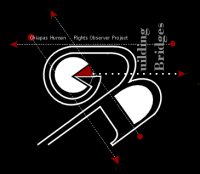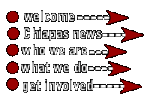

The Building Bridges in Chiapas Human Rights Observer Project
A Heart of Darkness: Low Intensity Warfare
Observer Report from Guy Warrington
In truth there was no other safe way of keeping possession of that country but to ruin it...if he does not separate and disperse the inhabitants, they will on the first occasion invoke the name of liberty and the memory of their ancient institutions...
(The Prince, Niccolo Machiavelli, 1513)
While Chiapas, in our opinion, does not pose a fundamental threat to Mexican political stability, it is perceived to be so by many in the investment community. The government will need to eliminate the Zapatistas to demonstrate their effective control of the national territory and of security policy.
(Riordan Roett - Chase Manhatten Emerging Markets Group Memo, 1995)
They took everything we had, burned our houses, and stole our animals. My family and I were forced to flee into the mountains for two months and live in plastic tents.
(Indigenous farmer, Polho, Chiapas, Mexico, December, 1999)
The van carrying our team of human rights observers rounded a corner to the first check-point. The van slowed. Eight or nine soldiers lined the side of the road. For the indigenous population of Chiapas, the North American Free Trade Agreement (NAFTA) has come at the point of a gun. A soldier approached the van asking for passports and travel documents; we obliged. We pretended to be tourists to avoid being expelled. Our destination as well as our passport numbers were recorded by an immigration official and we were sent on our way. The observers that went before us decided to not show their passports in protest of the practice - a small victory. The second check-point proved no different.
Our little red colectivo wound its way into the mountains of Chiapas, passing many small rough wooden houses and impoverished farms. The deep green of mountain jungles rose sharply, to meet a light blue sky of late morning . Small children walked along the side of the road carrying impossibly large bundles of firewood. We arrived at Polho and were quietly greeted by a people determined to change a five-hundred-year tide of history - against formidable odds.
Polho is located some two and a half hours from the city of San Cristobal and is home to approximately 6,500 displaced people. It is situated high in the mountains between the towns of Acteal and Canolal. In 1997 Acteal was the sight of a massacre committed by local paramilitary where 46 people were killed (2). Most of the dead were made up of women and children. Even Canolal, a PRI* community of 200 families which supports the Mexican ruling party, has seen incidences of harassment by the local paramilitary over the last several years, resulting in approximately 100 families fleeing to other areas in search of safety (3).
Majomut, one of the regions important military bases, is only ten minutes away on foot from Polho. Both the Social Labour Army and special forces units are stationed there. Community leaders have estimated that there are between 6,000 - 7,000 military personnel in the area (4).
Both the military and paramilitary are a constant threat to the indigenous population. Disappearances, detentions, and outright attacks happen with relative frequency. In our first meeting with one of the village responsibles, he spoke of his fear that members of the community would be attacked by the paramilitary when they endeavour to harvest coffee from their land (5). Twelve days later we learned that the fear surrounding the attacks are well justified. Paramilitaries were preventing people from returning to their land, attacking them whenever they attempted to do so. They also stole coffee at every opportunity, depriving the community of even these meagre economic resources (6). Later I was shown nearly a dozen photographs depicting the Mexican military attacking women with bayonets fixed to their rifles. The women, surrounded by soldiers, look terrified with hands out in a futile attempt to stop the attack (7).
The military, however, denies that there is a war in Chiapas. In an interview with General L. Smith. J. (Social Labour -Highland Forces), he stated that the primary role of Social Labour in Chiapas is similar to that of U.S. Forces during Vietnam, providing food, medical care and security to both local and outlying areas. When asked if he had received complaints from communities about the militarys presence, he responded in the affirmative saying that some people complained of oppression on the part of the military - but he put this down to simple psychosis. The general later admitted that there was a war, but said that it was not a political one but rather a civil war punctuated by revenge killings. He then referred to the incident at Acteal, in which 45 people were killed by supporters of the Mexican government, as an example. Asked whether the United States was formally supporting the military in Chiapas, the general answered very frankly saying that Mexican troops regularly received training in psychological operations, counter insurgency, and narcotics detection from the U.S. military. He then added that Mexico and the U.S. had a formal agreement regarding the use of American aircraft for the detection of narcotics, but stated that the aircraft had no military significance (8).
Late December and early January, however, witnessed a considerable deterioration in the political situation, with increased military patrols and check-points as well as attacks by the paramilitary on peasant communities (9). A recent communique from a human rights observer indicates: Things have heated up; so far [there have been] more situations in the last six days than in all of 1999....
The problems that Polho faces are not solely military in nature. The most pressing problems are food and health-related; the very young and very old suffer most. The displaced indigenous population of 6,500 relies heavily on food aid from both international and national humanitarian organizations such as the International Red Cross, the European Union, and Enlace Civil.
The average family size in Polho is 7 - 9 people. Food arrives every 15 days and each family receives 2.5 kilograms of rice, 3 kilos of corn flour, 1.5 kilos of beans, salt, and one quart of sugar. Although the food is expected to last 15 days, most families have trouble passing even the seven-day mark with these rations, according to one of the responsibles (10). A current report from a human rights worker at Enlace Civil agrees, saying that, ...the International Red Cross is supporting them by giving them food; however, it is not enough. (11).
In the month of January these problems were further compounded by the fact that Enlace Civil had to end its food aid program due to lack of funds. We were sending them [Polho] corn but the problem is that we no longer have the money to do so. (12).
At the beginning of last May, the situation in Polho grew more complicated. Food is in such short supply, that even the basic necessities are not being met. Adding to this, the military and police have surrounded the village, interrogating and searching villagers when they try to leave to gather firewood. (13). If you over there could do something to help..., pleads an Aid Worker .
Foot Notes
(1) Autonomous communities or pro-EZLN communities, have refused to recognise local governments which support PRI politicians. Autonomous communities are generally not officially acknowledged by state authorities.
(2) United Nations press release, Secretary-General Strongly Condemns Massacre in Chiapas, Mexico, December 24, 1998. The United Nations has put the death toll at 46.
(3) Christian Peace Maker Team Report, Update: December 5 - 26, 1999. *(PRI: Institutional Revolutionary Party - the ruling government party for over 70 years)
(4) interview with a village responsible, Polho, Chiapas, Dec. 15, 1999
(5) interview with a village responsible, Polho, Chiapas, Dec. 6, 1999
(6) interview with a village responsible, Polho, Chiapas, Dec. 15, 1999
(7) interview with a village responsible, Polho, Chiapas, Dec. 7, 1999
(8) interview with General L. Smith .J (Social Labour Highland Forces), Majomut, Chiapas,
Dec. 9, 1999. * Social Labour is the Mexican militarys equivalent of the Red Cross. A typical team is made up of: a doctor, a dentist, several dental assistants, six cooks, and 17 armed soldiers. (Translated by Lynn Stoltfus a member of CPT.)
(9) See Juan Balboa, Masked PRIs Harassing Zapatista Communites,
La Jornada, November 17, 1999
(10) interview with a village responsible, Polho, Chiapas Dec. 14, 1999
(11) e-mail interview Enlace Civil, Feb. 12, 2000 (Translated by Erika Fuchs)
(12) e-mail interview Enlace Civil, Feb.12, 2000 (Translated by Erika Fuchs)
(13) e-mail interview Enlace Civil, May 21, 2000 (Translated by Guy Warrington)
Click here to return to Building Bridges Getting Involved.